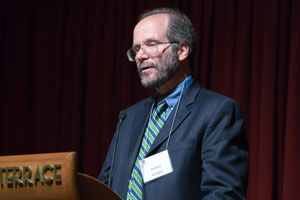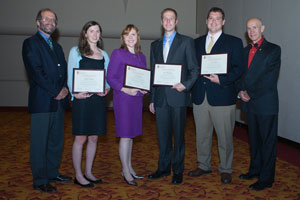
Dean Robert Golden thanked Middleton Society members for their commitment to the School of Medicine and Public Health and their generous support of our mission. “We simply cannot thank you enough for all that you do for our students, faculty, staff, and most important — the patients and communities whom we serve,” he said.
Dr. Robert N. Golden, dean of the School of Medicine and Public Health, lauded the caliber of this year’s incoming class during the annual Middleton Society Celebration September 16 at Monona Terrace.
About 175 of the School’s top donors gathered for the annual celebration to thank friends, honor outstanding students and faculty, learn about the School’s progress and hear Dr. James Stein, chief of the Division of Cardiovascular Medicine, discuss heart disease prevention.
The School welcomed 175 new students this year, selected from almost 4,000 applicants. “While 75 percent are Wisconsin residents, they come to us from the nation’s top colleges, including Harvard, Yale, MIT, Berkeley and UW-Madison,” Golden said.
“They have diverse background and life experiences, including prior military service, professional and Olympic level sports backgrounds, and service as teachers, EMTs, medical interpreters, and international charity work,” he added. “Most important, our students are the heart and soul of our enterprise, and they bring an infectious enthusiasm and energy to our campus every day.”
Gena Cooper Kurth, Ian McLaren, Caitlin Wallach and Joseph Wildenberg received the 2011 Charles Russell Bardeen Fourth Year Student Award that acknowledges their academic success, personal character and professional ethics.

Dean Robert Golden, left, and Wisconsin Medical Alumni Association President Donn Fuhrmann, right, flank this year’s Charles Russell Bardeen Fourth Year Student award winners, from left, Caitlin Wallach, Gena Cooper Kurth, Joseph Wildenberg and Ian McLaren.
Guests also had the opportunity to visit with medical students enrolled in the Wisconsin Academy for Rural Medicine, Training in Urban Medicine and Public Health, and Rural and Urban Scholars in Community Health. The programs encourage students to practice in rural areas and inner cities.
The School’s top priority is its ongoing transformation into a school of medicine and public health, Golden said, adding the pivotal resource for that transformation is the second tower of the Wisconsin Institutes for Medical Research. The first tower, dedicated largely to the Carbone Cancer Center, “has created an environment which brings together, under one roof, and without dividing walls, basic scientists, clinical investigators and population health researchers in a new integrated model. Most importantly, they are connected, quite literally, to our teaching facilities and our university hospital.”
The second tower will create the same synergy for cardiovascular science, neuroscience and vision research, while moving the McArdle Laboratory from central campus to space connected to the Carbone center.
Dr. Michael Fiore (’09 EMBA BUS) received the 2011 Folkert Belzer Award in recognition of his lifetime contributions to the School. Fiore founded and remains director of the UW Center for Tobacco Research and Intervention and is internationally recognized for his leadership in creating clinical strategies and public policy to reduce tobacco use and in identifying the medical and public health consequences of tobacco addiction.
